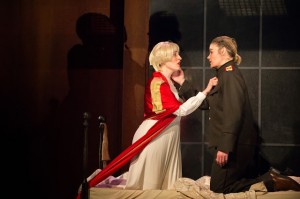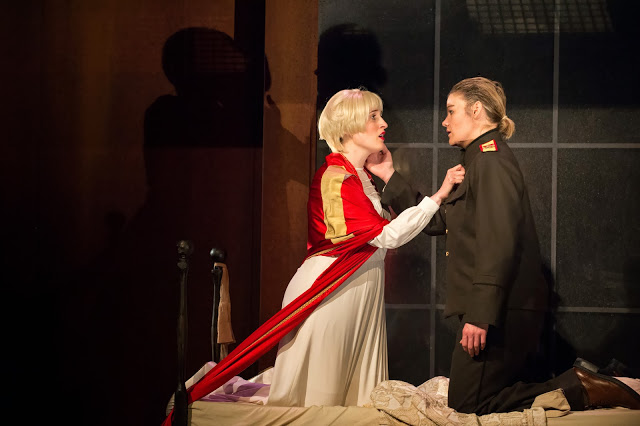
If you’ve been following my series of posts about the Venetian operas that ETO are bringing to Durham next week, you’ll remember I said that at the end of Agrippina everything ended happily. Well, not for long, because in terms of plot, Handel’s opera is just a prequel to Monteverdi’s Coronation of Poppea and this time, things get nasty. When we left Nero, Poppea and Otho at the end of Agrippina, Nero had got the throne and Otho had got the girl, but somehow in the meantime, Nero has contrived to get the throne and the girl, plus an unwanted wife Ottavia. In Agrippina Poppea seems quite mild, just a silly, vain girl, but now that she’s the Emperor’s mistress, she’s grown up, and is absolutely relishing the heady mixture of power and sex that’s come her way. Judging by the duets she sings with Nero, it’s extremely good sex too: the part of Nero is written for the mezzo-soprano/counter-tenor range, so the voices of the two lovers blend and entwine so closely, and with such sensuous music that we feel like voyeurs. The words of their famous closing duet Pur ti miro look innocuous enough – I adore you, I embrace you, I am yours my dearest – but Monteverdi creates a gem of sliding dissonances, sighing falling phrases and an excited “yes, yes, yes!”, and the whole thing reeks of dangerous obsession.
The opera begins with the classical device of using deities to set up the human actions; in this case, it’s Virtue, Fortune and Love who are squabbling over who’s in control and the tone for the whole work is set by Fortune’s opening words –
Virtue, go hide yourself away,
now you’re living from hand to mouth.
You’re a goddess none believes in,
you’re a goddess with no temple:
with no priest nor disciples, without any altars.
Disregarded and discarded,
so neglected, so dejected,
that I ask was your name ever respected?
The amorality of The Coronation of Poppea is startling – virtue is indeed banished and forgotten. To begin with, Poppea looks as if she’s simply fallen for the old story of the adulterous man who swears that his marriage is dead and that he will leave his wife for her, but Poppea’s willpower and Nero’s obsession are a different matter. Otho, who Poppea has spurned for Nero, seemed to be quite a decent chap in Agrippina but now he’s not above shamelessly exploiting another woman who does love him, using Drusilla for consolation and letting her be dragged into Ottavia’s plot to kill Poppea.
Poppea was one of the first operas to use real historical characters, and although the librettist Busenello cheerfully admitted that all the action of the opera is fictitious and characters have been distorted the spirit of Nero’s Rome is easily recognisable. The opera was first performed in Venice for the 1643 carnival season, another version was performed in Naples a few years later, and no definitive edition of the work seems to exist, so there is a bewildering set of recordings. I had trouble when researching this post, as I could only find one English libretto online, this being a PDF of the sleeve notes for Raymond Leppard’s 1971 recording, and it’s quite different to the recordings on Spotify. Spotify’s terrible presentation of track information for classical music didn’t help me to untangle things, but I’ve done my best.
Opera as we know it began life when renaissance scholars sought recreate the performance practices ancient Greek drama – hence the classical themes – and the first works, now mostly lost, used mostly recitative with light accompaniment. Monteverdi took this idea, and added arias, duets and ensemble singing, using the power of music to add expressiveness and psychological insight to the text. There’s a freshness about The Coronation of Poppea that comes with the newness of the genre; the clichés of opera are not yet embedded, and nor are the more rigid formalisations that audiences expected later in the baroque. The arias and recitative merge comfortably into each other, there are no set-piece dances, no show-off da capo arias, and certainly no comfortably moral ending.
My selection of music comes from Richard Hickox’s recording. Monteverdi’s seamless writing means that some of the tracks are a bit long, but the music is gorgeous, so listen and enjoy.
Speranza, tu mi vai – Poppea and Arnalta
Poppea gleefully delights in Nero’s promises to make her his empress, while her nurse Arnalta warns her to be careful. In a joyful stomp, accompanied by warlike strummed strings, she cries that the goddesses of Love and Fortune are fighting on her side.
Come dolci, signor – Poppea and Nero
Poppea at her worst. We begin with voyeuristic post-coital bliss (along the lines of “how was it for you?”) and before we know it, Poppea is persuading Nero to have people killed.
Amici, è giunta l’ora – Seneca
The stoical Seneca is perhaps the closest the opera has to a good guy and Monteverdi gives him a wonderfully sonorous bass part. In this scene he is stoically bidding farewell to his friends before his suicide. In overlapping, rising chromatic lines, they plead with him to reconsider.
O felice Drusilla, o che sper’io? – Drusilla
A sweet little aria from Drusilla, who is at this point happily believing that Otho loves her.
Addio, Roma! Addio, patria! amici, addio! – Ottavia
Nero’s spurned Empress, Ottavia, gets a good share of gorgeous Monteverdi laments, the last of which is her farewell to Rome as she is banished.
A te sovrana Augusta – Nero and chorus
Wonderful baroque trumpets herald Poppea’s coronation.
Pur ti miro – Nero and Poppea
The utterly ravishing yet depraved duet that ends the opera. I’ve picked a different recording here – Philippe Jaroussky and Nuria Real on Christina Pluhar’s Teatro d’amore album. There are also some good videos of this duet on You Tube – Sarah Connolly and Alice Coote both make particularly fine Neros, and if you like Danielle de Niese pouting and writhing there’s plenty of that too.
English Touring Opera’s current production updates the action from ancient Rome to Stalinist Russia, which probably works perfectly well, given the opera’s stark illumination of the universal nastiness of which human beings are capable. It closes ETO’s Venetian Opera season at the Gala theatre on 6 November – details here.








